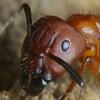- Formiculture.com
- Forums
- Gallery
- Members
- Member Map
- Chat

Queen Ant Fertility.
Started By
AntswerMe
, May 29 2017 7:34 AM
5 replies to this topic
#1
 Offline
-
Posted May 29 2017 - 7:34 AM
Offline
-
Posted May 29 2017 - 7:34 AM
Hi. I caught two Camponotus castaneus queens over a week ago, and am wondering if they have even mated. Queens usually take off their wings (but not always) after they land from their nuptial flight, and these two have not. I caught one of the queens after I saw it fly to the ground, and the other I saw laying on some porch stairs. These queens are not making any effort to escape, which gives me some hope, and I'm sure it would be very unlikely that they both would not have mated. What do you think?
#2
 Offline
-
Posted May 29 2017 - 7:52 AM
Offline
-
Posted May 29 2017 - 7:52 AM
Some queens may choose not to shed their wings after mating, so this is not always a guaranteed indicator on whether or not they have mated. I have a recent Camponotus queen who is laying eggs and she still has her wings. Various other ant-keepers have had similar experiences as well. I would just place them in a founding setup somewhere dark and leave them be for a few days. People generally say to leave them alone as much as possible and check on them once a week or so. While I try to do this, I often checked on the bigger species (like Camponotus) after 2 - 3 days to see if they had managed to rip the cotton balls to shred or attempted to escape. I have noticed that vibrations more than anything disturbs them the most during the early stages of egg laying.
Also just be mindful that they prefer warmer temps and a non-air conditioned room is best.
Keeper of:
Prenolepis imparis (4 founding queens)
Camponotus pennsylvanicus (5 founding queens)
Reticulitermes flavipes (3 pairs, subterranean termite)
#3
 Offline
-
Posted June 3 2017 - 6:47 PM
Offline
-
Posted June 3 2017 - 6:47 PM
Myrmidon, I've got several soleopsis invicta queens that have lost their wings. I've got them in standard test tube setups, but none are laying eggs. I've been keeping them inside my house - the ant farmer I bought them from said I should keep them air conditioned. Very interesting regarding what you said about keeping them in non-air conditioned rooms. It sounds like maybe I should keep them in the garage? I'm in Houston, very hot. Maybe in the garage, back towards the back to keep them out of the light as much as possible, but keep the door open so they don't burn up? Thanks!
#4
 Offline
-
Posted June 11 2017 - 6:40 PM
Offline
-
Posted June 11 2017 - 6:40 PM
Myrmidon, I just checked on the two queens yesterday and they both have eggs and are tending to them now. What a relief! It took them much longer than I anticipated, but I'm glad they are finally getting started.
#5
 Offline
-
Posted June 11 2017 - 6:44 PM
Offline
-
Posted June 11 2017 - 6:44 PM
Saltynuts (nice name), Solenopsis invicta grow extremely fast compared to other ants in a warm non-air conditioned room. Keeping them in a cooler air conditioned room will slow their growth rate down. So, if you want fast growth, keeping them in a warm garage may be a good idea. Just don't toast them. 
#6
 Offline
-
Posted June 11 2017 - 7:11 PM
Offline
-
Posted June 11 2017 - 7:11 PM
A queen laying eggs does not mean that they are fertilized. Unfertilized (haploid) eggs will develop into males.
Fertility is cited all the time for queen failures, but none of those reporting it have taken any measure to confirm so.
- Martialis likes this
If you've enjoyed using my expertise and identifications, please do not create undue ecological risk by releasing your ants. The environment which we keep our pet insects is alien and oftentimes unsanitary, so ensure that wild populations stay safe by giving your ants the best care you can manage for the rest of their lives, as we must do with any other pet.
Exotic ants are for those who think that vibrant diversity is something you need to pay money to see. It is illegal to transport live ants across state lines.
----
Black lives still matter.
0 user(s) are reading this topic
0 members, 0 guests, 0 anonymous users














